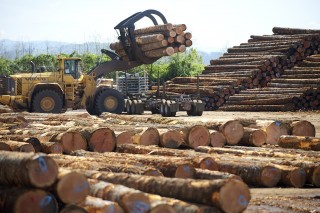Global Witness in a new investigation reveals systemic illegal logging by a major European company in the Democratic Republic of Congo (DRC), while Norway and France are on the brink of funding expansion of the country’s industrial logging sector, a decision that will benefit foreign powers than the local Congolese population.
The two-year investigation reveals that European company Norsudtimber – the biggest single owner of logging concessions covering over 40,000 kilometres of rainforest in the DRC, is operating illegally on 90 percent of its sites.
At the same time, the report says, Norway and France are planning to fund an US$18 million programme, which includes backing the expansion of industrial logging in DRC and support to Norsudtimber – which is headquartered in the Alpine tax haven of Liechtenstein. This directly contradicts both countries’ climate and forest protection goals.
The report shows that expanding industrial logging in DRC’s rainforest could generate 35 million tonnes of extra carbon dioxide emissions per year, thereby accelerating climate change.
China, Vietnam, France and Portugal are also all failing to stop Norsudtimber’s illegal timber trading: 78% of its timber exports went to Vietnam and China between 2013 and 2017, 11 percent went to Europe, with the majority going to Portugal and France. Almost 60 percenTof the timber exported comes from endangered or vulnerable tree species.
The report shows how a global web of secrecy – made up of tax havens and shell companies listed in Liechtenstein, Dubai and Hong Kong – is facilitating this illegal international trade whilst protecting three Portuguese brothers at the head of the company from scrutiny. Norsudtimber’s detailed response to the allegations is included in Global Witness’ report.
Norsudtimber meanwhile has given a detailed denial, but the investigation reveals the failure of governments, donors and traders to prevent the destruction of one of the world’s most climate-critical rainforests – despite the existence of national and international political and legal systems designed to protect it. “The result is a total systems failure. This is where the system has broken down,” says the report.
The DRC government has failed to uphold its own laws
The DRC government is the first line of defence against illegal or unsustainable logging operations. Yet the report says government is complicit in ongoing illegal logging by companies like Norsudtimber, by telling them they can ignore the law. “The DRC government has also announced its intentions to lift the moratorium on the allocation of new industrial logging concessions. Moves are already underway to open up even greater swathes of rainforest to yet more loggers, while those there already operate illegally and with impunity,” it says.
The report accuses donors for failing to stop their political and financial support for industrial logging: Meanwhile, governments who sit on the board of the Central African Forests Initiative (CAFI) such as Norway, France, Germany and the UK, are also poised to support the expansion of industrial logging. Donors such as Norway and France, refuse to pull the plug on their support to logging companies and their support to lifting the moratorium – despite evidence that companies like Norsudtimber are illegally logging, and that lifting the moratorium would allow loggers to continue to exploit and ransack the rainforest.
The report says those foreign governments justify their actions through the ultimate contradiction: that loggers can, in fact, bring environmental sustainability to the DRC’s rainforests and development to local indigenous populations. This idea is inspired by a euphemistic and self-serving theory called “sustainable forest management”, which encourages chopping down trees in theory sustainably, with scant scientific backing, and poor on-the-ground evidence.
According to the report, there is also little to no evidence that communities actually benefit from logging activities. While donors champion the right of free, prior and informed consent (FPIC) of the local communities, communities cannot choose freely when the promise of access to health and education is made entirely conditional on accepting logging operations within forests on which they are reliant for their livelihoods.
“Importers and traders have failed to exercise adequate due diligence: The logs harvested by Norsudtimber are destined for markets in Europe, Asia and the United States. They are channelled, on paper at least, mostly through tax havens, and the laws to restrict illegal timber in consumer markets do not exist or are failing. In the huge consumer and processing markets of China and Vietnam, there are no laws in place to prevent this international trade,” the report says.
The report cites the US and EU where such legislation exists, but in key gateways – France and Portugal, particularly – application and enforcement have been patchy and weak.
Finally, the report says, a fragile political environment helps mask the systems failure and provides impunity: The DRC is in the depths of political crisis as civil war looms large once again, and President Kabila’s refusal to step down, at the expiry of his constitutional term in December 2016, is worsening a dire state of governance in the country.
The United Nations (UN) estimates that 13.1 million Congolese are in “dire” need of humanitarian assistance, and 4.49 million individuals have been internally displaced due to growing violence. In response, the UN has launched an appeal for US$1.68bn for 2018. This crisis is taking place in what can only be described as the widespread looting by political elites of DRC’s natural resources.
For example, the report says, in recent years, the DRC has lost more than US$1.36bn in revenues from the under-pricing of mining assets sold to offshore companies, thanks to shady deals. In April 2018, it announced new plans to declassify parts of the Virunga and Salonga national parks for oil exploration, in violation of the Unesco World Heritage Convention. Government ministers do not heed the law, the government is cracking down on civil society organisations and companies operate as they please with little consequence, placing the country’s resources at a growing risk of corporate and state looting. Companies like Norsudtimber are exploiting this environment and wreaking havoc on our planet.




